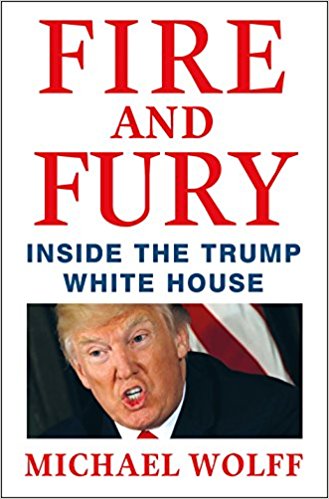You have /5 articles left.
Sign up for a free account or log in.
 Fire and Fury: Inside the Trump White House by Michael Wolff
Fire and Fury: Inside the Trump White House by Michael Wolff
Published on January 5th, 2018.
Writing these words is taking me away from reading Fire and Fury: Inside the Trump White House.
According my Audible iOS app, I have two hours and 39 minutes left in the audiobook. So I’m about 9 hours into Trump world.
I have nothing useful to add to our national conversation about the subject of Wolff’s book. You will believe what you will believe, and the stories detailed in Fire and Fury will change exactly nobody’s mind.
Quite the opposite, as we now know that arguments and information that run counter to our prior beliefs only serve to harden those opinions.
What I do want to talk about is, that for a brief time, everyone is talking about a book.
A book.
When was the last time that a book was the lead story in a nightly network news broadcast?
Folks on my campus are chatting about the book.
My wife is talking about the book. (She is seldom interested in the sorts of books that I read, claiming she does not need to read them as I talk about them incessantly).
My kids are talking about the book.
My older daughter was upset that I purchased the audiobook version, as not being an audiobook listener herself (a parenting fail if there ever was one) she would have to purchase the e-book.
When was the last time that you had a conversation with both academics and an emerging adult about the same book? (Harry Potter books don’t count).
If I ever ran a college (no risk there, but just saying…) I would have taken this week to buy everyone on campus a copy of Fire and Fury. When do we ever get a chance to have a campus-wide bookclub with a book that everyone may actually want to read?
We need to be reminded that books help create our culture. In this golden age of TV, it is a good week when something other than the latest binge-worthy drama is what everyone is talking about. (Incidentally, Wolff also wrote the excellent 2015 book Television Is the New Television: The Unexpected Triumph of Old Media in the Digital Age).
Thinking about the power of books to shape our culture should also remind us about the dangers of running our book economy through Amazon. I purchased Fire and Fury Audible, which is owned by Amazon.
Might a national event like Fire and Fury be a moment for academic libraries to lead a conversation about the emergence of a monopolistic digital book market?
Can we utilize the broad interest in Fire and Fury to inform ourselves about the advantages and risks of our new book economy?
What was the last nonfiction book that amounted to a cultural event?
Do you have plans to read Fire and Fury?




